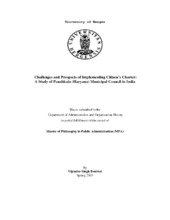Challenges and Prospects of Implementing Citizen’s Charter: A Study of Panchkula (Haryana) Municipal Council in India
Master thesis

View/
Date
2005Metadata
Show full item recordCollections
- Department of Government [443]
Abstract
The Citizen’s Charter has been adopted as a device by the Government of India to induce clienthis research primarily used a qualitative perspective, attempting to discern the meaning ofhe empirical evidence suggests that even after one year of its existence, the charter has notfocus in the bureaucracy. Its main agenda was to make administration more accountable,responsive, transparent and people-friendly. The charter programme initiatives in essencepropose to make public service provision less bureaucratic-dominated and more citizen-led. Itaims to empower citizens by mentioning their rights, privileges and duties. Further, the CCstrives to develop partnership between citizens and PMC officials to promote joint decisions.Tevents to the participants. Both primary and secondary sources of data were used to getcomprehensive picture of the reality. The researcher contacted with different participants - PMCofficials, Municipal Councilors and Citizens to gather information. Besides, officials’ records,documents and other secondary sources were utilized.Tmade any substantial dent on old bureaucratic service delivery mechanism .The Bureaucraticmachinery is still strongly mantled in old set-up, and hence, trying to revert the charterprogramme. The political executives do not have much concern to further the CC movement. Suchattitude on their part has weakened the effectiveness of the charter. On the other hand, thecitizens are totally ignorant about the charter programme initiatives. Many frontline officials arealso not familiar with the CC measures. The officials hardly made any endeavour to take thecharter programme at their door-steps. Those factors, therefore, are constraining the successfulimplementation of the citizen’s charter at the Panchkula Municipal Council.
Publisher
The University of BergenCopyright
The authorCopyright the author. All rights reserved